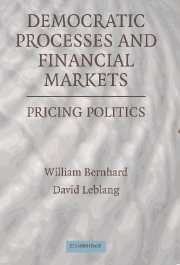Book contents
- Frontmatter
- Contents
- Acknowledgments
- 1 Introduction
- 2 Democratic Processes and Political Risk: Evidence from Foreign Exchange Markets
- 3 When Markets Party: Stocks, Bonds, and Cabinet Formations
- 4 The Cross-National Financial Consequences of Political Predictability
- 5 Cabinet Dissolutions and Interest Rate Behavior
- 6 Bargaining and Bonds: The Process of Coalition Formation and the Market for Government Debt in Austria and New Zealand
- 7 Time, Shares, and Florida: The 2000 Presidential Election and Stock Market Volatility
- 8 Polls and Pounds: Exchange Rate Behavior and Public Opinion in Britain
- 9 Conclusion: Political Predictability and Financial Market Behavior
- References
- Index
3 - When Markets Party: Stocks, Bonds, and Cabinet Formations
Published online by Cambridge University Press: 02 December 2009
- Frontmatter
- Contents
- Acknowledgments
- 1 Introduction
- 2 Democratic Processes and Political Risk: Evidence from Foreign Exchange Markets
- 3 When Markets Party: Stocks, Bonds, and Cabinet Formations
- 4 The Cross-National Financial Consequences of Political Predictability
- 5 Cabinet Dissolutions and Interest Rate Behavior
- 6 Bargaining and Bonds: The Process of Coalition Formation and the Market for Government Debt in Austria and New Zealand
- 7 Time, Shares, and Florida: The 2000 Presidential Election and Stock Market Volatility
- 8 Polls and Pounds: Exchange Rate Behavior and Public Opinion in Britain
- 9 Conclusion: Political Predictability and Financial Market Behavior
- References
- Index
Summary
The outcomes of democratic political events – which party will win the election, which parties will form the cabinet, who will become Prime Minister – are often predictable. When market actors can easily forecast the political outcome, we expect market behavior to remain relatively stable. On the other hand, when political outcomes are less predictable, market actors will shift their portfolios out of assets whose value is vulnerable to alternative government policies toward assets offering returns that are better insulated. Therefore, we expect returns to be relatively lower in these vulnerable markets during periods of pronounced political uncertainty.
In this chapter, we assess this proposition more systematically. We continue to examine parliamentary politics. But we go beyond the simple periodization of campaigns, elections, and cabinet negotiations to discuss the predictability of coalition formations. To do so, we exploit a highly developed political science literature on cabinet government. This literature has produced models that, given the distribution of legislative seats and the policy positions of the different parties, predict which parties will form the cabinet, which policies the new government will pursue, and how long the new cabinet is likely to last. We draw on these models to develop proxy measures for the predictability of coalition formation events.
To evaluate how the predictability of cabinet formations affects asset markets, we focus on stock and government bond markets rather than currency markets. Foreign exchange trades on intermediated and disintermediated markets around the globe.
- Type
- Chapter
- Information
- Democratic Processes and Financial MarketsPricing Politics, pp. 49 - 85Publisher: Cambridge University PressPrint publication year: 2006
- 1
- Cited by

